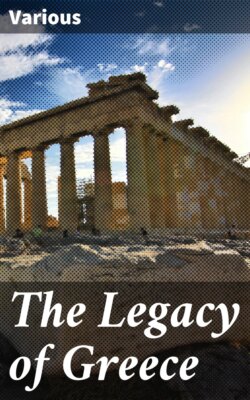Читать книгу The Legacy of Greece - Various - Страница 4
На сайте Литреса книга снята с продажи.
RELIGION
ОглавлениеTable of Contents
Those who write about the Greeks must beware of a heresy which is very rife just now—the theory of racialism. Political ethnology, which is no genuine science, excused the ambition of the Germans to themselves, and helped them to wage war; it has suggested to the Allies a method of waging peace. The false and mischievous doctrine of superior and inferior races is used to justify oppression in Europe, and murder by torture in America. It will not help us to understand the Greeks. The Greeks were a nation of splendid mongrels, made up of the same elements, differently mixed, as ourselves. Their famous beauty, which had almost disappeared when Cicero visited Athens, was mainly the result of a healthy outdoor life and physical training, combined with a very becoming costume. They were probably not handsomer than Oxford rowing crews or Eton boys. Their flowering time of genius was due to the same causes which produced similar results in the Italian Renaissance. The city-state is a forcing-house of brilliant achievement, though it quickly uses up its human material. We cannot even regard the Greeks as a homogeneous mixed race. The Spartiates were almost pure Nordics; the Athenians almost pure Mediterraneans. The early colonists, from whom sprang so many of the greatest names in the Hellenic roll of honour, are not likely to have kept their blood pure. Nor was there ever a Greek culture shared by all the Greeks. The Spartan system, that of a small fighting tribe encamped in a subject country, recalls that of Chaka’s Zulus; Arcadia was bucolic, Aetolia barbarous, Boeotia stolid, Macedonia half outside the pale. The consciousness of race among the Greeks counted practically for about as much as the consciousness of being white men, or Christians, does in modern civilization.
Greece for our purposes means not a race, but a culture, a language and literature, and still more an attitude towards life, which for us begins with Homer, and persists, with many changes but no breaks, till the closing of the Athenian lecture-rooms by Justinian. The changes no doubt were great, when politically Greece was living Greece no more, and when the bearers of the tradition were no longer the lineal descendants of those who established it. But the tradition, enshrined in literature, in monuments, and in social customs, survived. The civilization of the Roman Empire was not Italian but Greek. After the sixth century, Hellenism—the language, the literature, and the attitude towards life—was practically lost to the West for nearly a thousand years. It was recovered at the Renaissance, and from that time to this has been a potent element in western civilization. The Dark Ages, and the early Middle Ages, are the period during which the West was cut off from Hellenism. Yet even then the severance was not complete. For these were the ages of the Catholic theocracy; and if we had to choose one man as the founder of Catholicism as a theocratic system, we should have to name neither Augustine nor St. Paul, still less Jesus Christ, but Plato, who in the Laws sketches out with wonderful prescience the conditions for such a polity, and the form which it would be compelled to take. Even in speculative thought we know that Augustine owed much to the Platonists, the Schoolmen to Aristotle, the mystics to the pupil of Proclus whom they called Dionysius. Only Greek science, and the scientific spirit, were almost completely lost, and a beginning de novo had to be made when the West shook off its fetters.
Hellenism then is not the mind of a particular ethnic type, nor of a particular period. It was not destroyed, though it was emasculated, by the loss of political freedom; it was neither killed nor died a natural death. Its philosophy was continuous from Thales to Proclus, and again from Ficino and Pico to Lotze and Bradley, after a long sleep which was not death. Its religion passes into Christian theology and cultus without any real break. The early Church spoke in Greek and thought in Greek. In the days of Greek freedom to be a Greek had meant to be a citizen of a Greek canton; after Alexander it meant to have Greek culture. None of the great Stoics were natives of Greece proper; Zeno himself was a Semite. Of the later Greek writers, Marcus Aurelius was a Romanized Spaniard, Plotinus possibly a Copt, Porphyry and Lucian Syrians, Philo, St. Paul, and probably the Fourth Evangelist were Jews. These men all belong to the history of Greek culture. And if these were Greeks how shall we deny the name to Raphael and Michael Angelo, to Spenser and Sidney, to Keats and Shelley? When Blake wrote—
